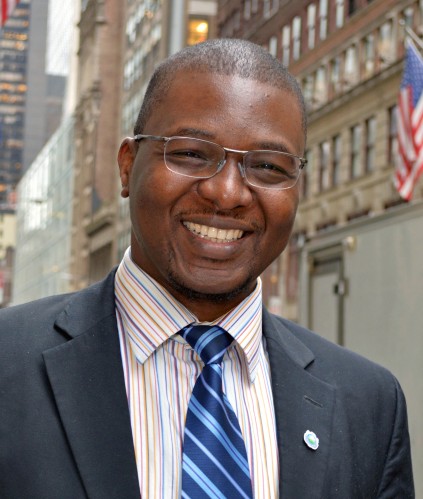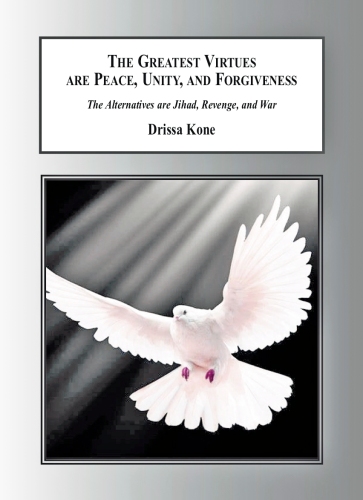By Drissa Kone
 Listening to someone in pain is the most valuable gift we can offer to heal a broken relationship. We may know that forgiving is a valuable thing to do, but most people do not know how to forgive someone who hurt them.
Listening to someone in pain is the most valuable gift we can offer to heal a broken relationship. We may know that forgiving is a valuable thing to do, but most people do not know how to forgive someone who hurt them.
Choosing to listen to the pain of another helps us to be in touch with our true self, which indeed is not so different from the other person. When the connection is made through listening, healing and forgiveness happen. The powerful principle of listening is it creates space for understanding others and pursuing a deeper human connection.
The need to be understood and accepted is a universal psychological need for all people, and it can be done powerfully through listening. By listening, a broken relationship can be healed and opposing views united.
I have experienced these moments with people close to me. Several times my wife would scold me for not doing what she asked. Often, I tried to defend and protect myself and justify my behavior. However, those psychological defense mechanisms have their limits.
According to Richard Salem, empathic listening is a way of listening and responding to another that improves mutual understanding and trust. When we are attacked, we tend to react and defend, but when we can pause and listen to the deeper concern of the person attacking us, healing and understanding happen right away.
Listening is being present in the moment of pain without fighting back, but rather being vulnerable through a sincere apology in a calm state. That moment is one of accessing the inner peace from within. This is where the power to connect to God is found. It is also a moment where we connect to God in the other person who is suffering. No one, including wild animals, can resist the power of listening.
This kind of listening is not about how to respond to a question or analyzing an issue. It is not a mental exercise. It is a moment when we encounter the God within us. It is a place of no fear. We cannot access that reality by reasoning and focusing on how we are being hurt. It is the place of oneness with the universe. This is the place where the past no longer influences us. It is the place where the future does not exist. The only moment that exists is the Now, as Eckhart Tolle described in his book, The Power of Now.
People who know how to access the divine reality in the present moment can heal those in pain. They are the masters of forgiveness and givers of light, truth and real love. The more leaders who can be trained to access the divine power within themselves, the more we will have peace in the world.
What happens when we listen to someone else is that we are living in the present moment. In fact, everyone is capable of listening unless they have a serious mental disability. Most of the time when you observe two individuals arguing about an issue it is simply because they are not listening to each other. They are trying to use their logic to correct, judge, discriminate, and condemn. No peace can ever be built with the argument of being right and proving someone else wrong. It is vain and unnecessary.
Listening is an essential skill for third parties and disputants alike. It enables the listener to receive and accurately interpret the speaker’s message, and then provide an appropriate response. The response is an integral part of the listening process and can be critical to the success of a negotiation or mediation and can heal the divide. It also creates a safe environment conducive to collaborative problem-solving.
Listening to heal is beyond race and nationality. It is not an American, European, African, or Asian value, but a universal approach to create peace in everyday relationships. Listening effectively helps resolve interpersonal, interracial, intercultural, interreligious, and intra-group conflicts. Listening can help resolve interpersonal and family conflicts, organizational and group conflicts, and national and international conflicts. It is based on the principle that when we start to truly listen to one another, we start to understand and forgive each other.
Everybody desires to be understood — this is a natural human quest for peace and happiness. If we do not fully listen, we cannot fully understand, and unless we understand what really occurred it can become nearly impossible to forgive. When we forgive, we can reconcile and give broken relationships a chance to be rebuilt.
This kind of listening is not about winning an argument or being absolutely right, but rather connecting with the true self. It does not mean that the listener should necessarily agree with everything the speaker expresses, but it is important to enter the other person’s world and know them and understand their experience. It is then much easier to impart compassion and kindness toward the speaker.
In reality, when a speaker feels understood, he or she opens up about himself or herself more. Both the speaker and listener can then connect deeply on an emotional level, which will impact their relationship in a positive way.
While working on my doctoral degree, I had a chance to enter these deep moments of listening with people I was working with. My research was to find out the power of listening in resolving conflict. I was meeting with Ivory Coast community leaders in New York. Many Ivorians have been holding grudges against each other since the military coup of December 1999, the civil war of September 2002, and the post-electoral conflict of November 2010. The victims of the Ivorian Civil War are still dealing with past wounds that affect their relationships with one another in the diaspora.
I remember that day when I called one of the leaders of the ethnic group which was in conflict with my ethnic group back home. His first question was, “Who is this?” I answered, Mr. Drissa Kone, and he said, “What do you want?” I said I was working on a doctoral project to understand the impact of the Ivorian conflict … then he hung up the phone. I called back several times and no answer. Later, when I met him though his friend, he said his followers told him not to relate at all with those who hurt his parents back home. However, I was able to listen to him and a deeper connection exists between us today.
The results were phenomenal because I became a resource for those who were enemies in the community. I became the one both groups would contact to resolve an issue. Even after my doctoral project was completed, I became a mediator between groups and individuals in conflict. The method was to help them listen to one another the same way I did with them. When someone understands the power of listening, they become a natural healer and peacemaker for others.
The typical approach to conflict resolution is to make a proposal to secure divergent interests through compromise. However, most of these proposals fail because factions in a conflict are often still dealing with grudges, hurt, resentment, mistrust, etc. It is almost impossible for people to dialogue or negotiate an issue without first improving their relationship.
When done correctly, listening enables us to understand the other person according to his or her frame of reference. Appreciating a person’s worldview and experiences brings valuable insight to the process of understanding their emotional struggle. In fact, active listening can stop arguments and diffuse strong emotions such as anger, frustration and disappointment. It helps the speaker feel heard and accepted. It also creates an opportunity for the speaker to be influenced positively by the listener. A good listener helps discover the hidden truth of the real issue.
Stephen Covey clearly expressed the dynamic of listening when he wrote, “To feel understood is the deepest psychological need. Understanding comes through listening…most people listen with the intent to respond instead of listening with the intent to understand.” In fact, in any communication process, when the issue being dealt with is emotionally painful or potentially threatening, a genuine, caring attitude expressed through a willingness to listen becomes even more important. Few people will share their inner thoughts or emotions unless they feel that the listener cares about them. Curiosity, badgering, threats, and use of authority are all poor substitutes for honest caring.
Therapists are trained to listen in order to gather patient information and to support them through a healing process. However, what is happening in the listening process is the therapist is helping the patient to access the Now, the present moment beyond thinking. The same technique is useful in exploring and resolving conflict, especially when the listener is a mediator. After all, listening is the basis of all successful relationships. The better our listening skills, the better equipped we are to develop healthy, fulfilling relationships. By implication, listening helps to expose deeper interests and emotions hidden from view, and then to find a basis for understanding and ultimate resolution of struggles.
Listening is an important intervention tool that can be used to facilitate positive change within ourselves and others. Despite the popular notion that listening is a passive approach to resolving issues, several research initiatives provide clear evidence that listening is one of the most effective approaches to stimulate individual personality change as well as group development. Listening brings about changes in people’s attitudes toward themselves and others. It also brings changes in their basic values and personal worldview. Most people who experience this new dynamic gain emotional maturity. They become more open to their experiences, less defensive, more democratic and less authoritarian.
Listening is very simple. It just requires the listener to be present beyond thinking. However, it might appear difficult and even impossible for someone who never experienced it before. If you have a hard time listening, some daily meditation or sincere prayer is highly recommended to access the divine presence. The practice of meditation is in fact accessing the Now, the moment, the divine presence. Sincere prayer can also help us connect to the ultimate source of love, also known as the higher power.
Personal transformation is a journey and it can take a lifetime. Every day is a new discovery on our journey. The changes come slowly and sometimes with considerable difficulty, but nonetheless, they are worth achieving.
A 2010 scene from the Ivorian Civil War.
Be aware when listening to others
When we listen, we have to be patient not to interrupt the person speaking, even if what the person is saying is not what we believe. Sometimes we have a burning desire to stop the speaker and make our point. When we do that we move from the realm of Now, the divine moment, to an intellectual debate. This can easily intensify an argument and sometimes lead to violence. In order to show we deeply care about others and what they have to say, we must not interrupt them. Even if we disagree with them, we should show courtesy by letting them finish their point. We must give them a chance to voice their opinions and feelings.
Sometimes it is helpful to paraphrase the speaker when they pause. Paraphrasing helps the listener communicate their presence. For example, we could say, “Did I hear you say that you were rejected? Do you mean you have been humiliated?” When the response is “yes,” there is a mutual understanding right there in that moment.
We also need to be aware of our own past wounds so that when they are triggered in conversation, we can set them aside. Ultimately, listening is not about our past wounds and future worries; it is about the present moment. It is also okay to show our presence through interjection, and express our own feelings, such as “Oh, I am sad to hear this,” or “I am deeply moved by your story,” or “I am happy you were able to come through this,” or “This was inspiring to me.”
While we are listening, it is important to maintain eye contact, which is powerful and creates the dynamic of “give and take” in the listening process. It shows we are physically available to hear what the speaker is saying, but, more importantly, that we are willing to connect with their deepest self.
During the listening process, observe body language because it is a powerful way to tell where the speaker is at or is going. Facial expressions, and hand, arm or leg movements all tell the listener what is happening in the Now. Is the speaker feeling uncomfortable, embarrassed or embraced, fearful, rejected, judged, and so on?
The whole point of listening is to be “present.” This does not only refer to physical presence but being present in spirit. Sometimes we only pretend to listen while daydreaming about something else. When we are overwhelmed with our own situation and problems, it becomes difficult to fully absorb what others are saying. At this point, we need to realize we are not fully engaged in listening and make a concerted effort to release our thoughts to be “fully present” to the other person. It is a moment of communion with the divine.
Finally, listening is like drops of water that keep falling on a rock: Sooner or later the droplets will create a hole. As time goes by, we discover we are changing and becoming more settled and secure from within. We can then appreciate our impact on other people’s lives, and naturally become healers and peacemakers for our peers, friends, family members, co-workers, etc.♦
Adapted from the author’s book, The Greatest Virtues are Peace, Unity, and Forgiveness: The Alternatives are Jihad, Revenge, and War (Edwin Mellen Press, 2019), which can be ordered here.
Dr. Drissa Kone is Assistant Professor of Ministry at UTS, teaching courses in conflict resolution, interfaith dialogue, and Islamic studies. He also is the minister of the Belvedere Family Community in Tarrytown, NY. Dr. Kone was born and raised Muslim in the Ivory Coast and joined the Unification Movement in 2003. He earned his M. Div. in spiritual counseling from UTS (2012), and an M.A. in diplomacy, specializing in conflict management and negotiation, from Norwich University (2014). He obtained his D. Min. in peace and justice from UTS (2016), focusing on transformational leadership and the effective management of cross-cultural conflict between communities.



Thank you, Dr. Kone. Your essay reminded me of Maestro Daniel Barenboim who conducts an orchestra comprised of young musicians from Israel, Lebanon, Egypt, Syria, and Jordan. He says that this orchestra is not a “peace orchestra,” but rather an “anti-ignorance orchestra” and that in order for these musicians to get along it requires “sensitive speaking and painful listening.”
My impression from your book title was that it seemed a bit theoretical. Yet, after reading this book excerpt, there is definitely an applicable aspect to your book.
What I enjoyed the most about reading this article is the power of the word “listening.” It may be that since you are someone who practices this word very often, the word listening in this article came to carry substance and weight as you wrote.
Reading this compelled me to continue to practice listening to others.
A beautiful and insightful essay. In this ultra-connected world, so many are lonely and long for real connections. To “be heard,” by someone who simply listens, is a healing gift, water for the soul. I pray we all can learn to listen well.
Listening is one of the simplest, if not easiest, ways to connect with others. Thanks for reminding us of this powerful tool!